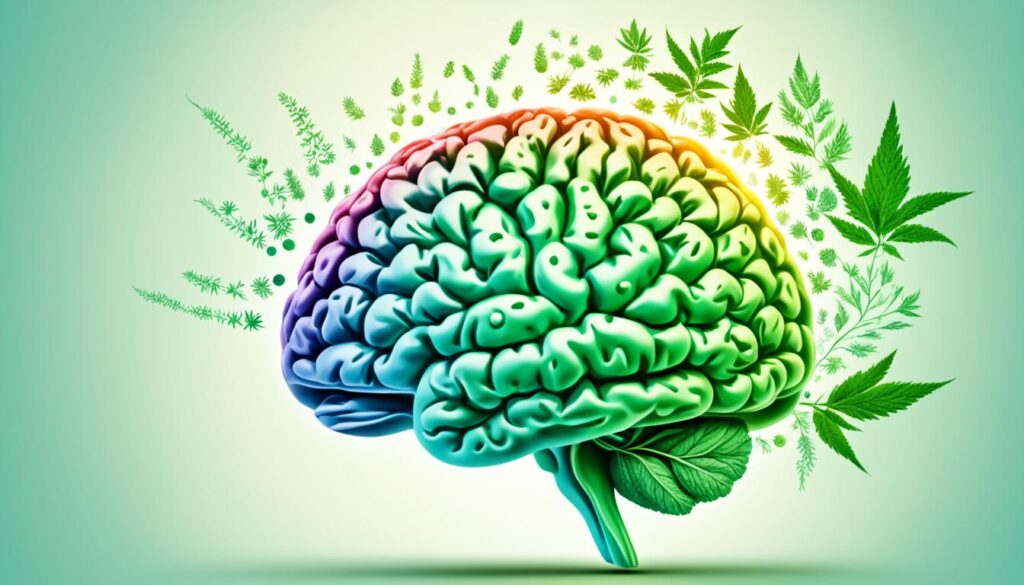Did you know CBD comes from the cannabis plant and is good for health? It helps with pain, mental health issues, and some symptoms of cancer. It’s also great for your heart’s health.

This guide will tell you about the many ways CBD can help you. Whether you need pain relief, better mental health, or a healthier heart, CBD might be what you need.
Key Takeaways:
- CBD, derived from the cannabis plant, has a range of health benefits
- It can relieve pain, reduce symptoms of mental health disorders, and alleviate certain cancer-related symptoms
- CBD may have neuroprotective properties and benefit heart health
- There are various CBD products available, including supplements, bath soaks, drinks, and food
- Consult with a healthcare professional before incorporating CBD into your wellness routine
May Relieve Pain
CBD, short for cannabidiol, has been used for centuries for pain relief. Studies now show it may help manage chronic pain and conditions like fibromyalgia. It seems to be effective in reducing discomfort.
CBD interacts with our body’s endocannabinoid system, which helps control pain. This interaction can reduce inflammation and affect neurotransmitters to ease pain. This is how CBD can target and possibly reduce pain.
People with chronic pain, such as fibromyalgia sufferers, might find CBD useful. It helps by lowering inflammation and changing how we feel pain. This could bring relief to those in constant pain.
“CBD has shown promise in relieving pain and improving quality of life for those living with chronic pain conditions. Its natural anti-inflammatory properties and interactions with the body’s endocannabinoid system make it an intriguing option for pain management.” – Dr. Jennifer Martinez, Pain Specialist
However, CBD doesn’t work for everyone. We need more research to understand how it works for pain relief. It’s not a one-size-fits-all solution, and its effectiveness can vary.
Thinking about using CBD for pain? It’s crucial to talk to a healthcare expert first. They can offer advice on whether CBD is right for you and how to use it safely, considering your health and medications.
Studies on CBD for Pain Relief
Research into CBD’s effectiveness for pain relief has been conducted:
| Study | Findings |
|---|---|
| A study published in the Journal of Experimental Medicine in 2012 | Overall, the results indicate that CBD may be a promising therapeutic agent for the treatment of chronic pain. |
| A review published in the European Journal of Pain in 2016 | Overall, the evidence suggests that CBD could be a useful option for managing different types of chronic pain. |
| A study published in Pain in 2018 | The researchers concluded that CBD may have therapeutic potential for the treatment of neuropathic pain. |
Although these findings are encouraging, more studies are needed. We must understand the best dosages, long-term effects, and how CBD works for various pain types.
Could Reduce Symptoms Related to Some Mental Health Disorders
CBD oil might help with depression, anxiety, and PTSD. It has properties that could lower these symptoms. This is due to its anxiolytic and anti-depressant effects. More studies are needed. But, CBD could improve mental well-being for many.
Benefits of CBD for Mental Health
CBD can be good for mental health. It might reduce anxiety symptoms. This is because it affects serotonin in the brain. Serotonin is key for mood and anxiety.
Also, CBD could lessen depression signs by improving serotonin signaling. Serotonin levels are often low in depression.
For those with PTSD, CBD might be helpful too. PTSD follows after a shocking event. CBD can ease the anxiety and fear tied to PTSD. This supports better health for those affected.
Enhancing Overall Mental Well-being
CBD isn’t a magic cure. But it can be part of a bigger treatment plan. It could boost mental well-being.
People say CBD eases stress and helps them sleep better. It works with the endocannabinoid system in our bodies. This system affects mood, sleep, and how we handle stress.
The impact of CBD varies per person. So, it’s key to find the right dose and product. Always talk to a medical professional before trying CBD.
May Alleviate Certain Cancer-Related Symptoms
For cancer patients, CBD might ease symptoms linked to the disease and its treatment. Studies suggest CBD can help with common issues like nausea, vomiting, and pain.
Many cancer patients struggle with nausea and vomiting from chemotherapy. CBD has been found to reduce these symptoms. This helps patients feel better overall.
Also, CBD’s role in pain management for cancer patients is under investigation. Chronic pain is a big problem during cancer treatment. CBD might be a natural way to relieve this pain.
Even though research shows CBD could help with cancer symptoms, the results vary. More studies are needed to fully understand how effective and safe it is.
If you’re thinking about using CBD for cancer, talk to a healthcare pro. They can offer tailored advice. This includes considering how CBD interacts with other meds.
“CBD shows promise in managing cancer-related symptoms like nausea, vomiting, and pain. But, more research is needed to confirm its effectiveness and safety.” – Dr. Sarah Thompson, Oncologist
Summary of CBD’s Potential Benefits for Cancer Patients
| CBD Benefits | Details |
|---|---|
| Nausea and Vomiting | CBD may help reduce chemotherapy-induced nausea and vomiting. |
| Pain Management | CBD could be a natural pain relief option for cancer patients. |

Using CBD may help with some cancer symptoms. But, it should be part of a full treatment plan ok’d by healthcare pros. It’s important to weigh the benefits and risks with a healthcare expert.
May Have Neuroprotective Properties
CBD is being studied for its possible help with brain disorders. Diseases like MS, Parkinson’s, epilepsy, and Huntington’s could benefit. These studies show CBD might protect brain cells and improve symptoms.
MS is a disease that makes muscles weak and causes pain. People with MS have seen less pain and muscle tightness with CBD. This makes their daily life better.
Parkinson’s disease makes it hard to move. Some studies reveal CBD might help with tremors and stiffness. More research is needed, but CBD shows promise for Parkinson’s patients.
Epilepsy causes seizures. The FDA has approved CBD for certain types of epilepsy. It can lessen how often and how severe the seizures are. This brings hope to those with the condition.
Huntington’s disease breaks down brain cells. Studies hint that CBD might slow this breakdown and help with symptoms. This suggests CBD could help protect the brain.
The proof for CBD’s help with brain disorders is still growing. But, early studies and people’s experiences point to its potential benefits. Always talk to a doctor before starting CBD for neurological issues.

References:
- Multiple Sclerosis Society. (n.d.). About MS. Retrieved from https://www.nationalmssociety.org/What-is-MS
- Mayo Clinic. (2021). Parkinson’s disease. Retrieved from https://www.mayoclinic.org/diseases-conditions/parkinsons-disease/symptoms-causes/syc-20376055
- Epilepsy Foundation. (n.d.). What is Epilepsy? Retrieved from https://www.epilepsy.com/learn/about-epilepsy-basics/what-epilepsy
- HDSA. (n.d.). What is Huntington’s Disease? Retrieved from https://hdsa.org/what-is-hd/
May Benefit Heart Health
Studies show that CBD might be good for the heart. This natural compound comes from the cannabis plant. People like it for its healing effects. However, we need more studies to understand how it affects heart health. CBD may make the heart beat more effectively and widen blood vessels. This could help lower high blood pressure.
Having high blood pressure can lead to heart problems. These include heart attacks and strokes. Using CBD might help keep the heart healthy by lowering blood pressure.
“CBD has shown promise in lowering blood pressure in the short term, but further research is needed to determine its long-term effects on cardiovascular health.”
A study in JCI Insight reported that CBD lowers blood pressure. It did this in healthy people, both at rest and when stressed. Another study found that in rats, CBD helped the heart pump better. It also reduced heart damage.

It’s vital to remember these studies are early. More research is needed to see how CBD affects human heart health. Always talk to a doctor before trying CBD for heart problems. This is especially true if you already have heart issues or are on medication.
The Connection Between CBD and High Blood Pressure
CBD could help with high blood pressure. It works with the body’s endocannabinoid system. This system helps control many things, including blood pressure.
Research shows CBD may improve blood flow by widening blood vessels. It also lowers inflammation. This can lead to lower blood pressure. CBD’s ability to relax blood vessels can help the heart work better.
“CBD’s ability to influence the contractions of the heart muscle and widen blood vessels may contribute to its potential as a natural remedy for high blood pressure.”
Future Research and Considerations
The early research on CBD and heart health looks promising. But, we should be careful and wait for more studies. We need more research to fully understand CBD’s long-term effects on the heart.
The rules around CBD are still changing. Also, not all CBD products are the same. Make sure you choose high-quality ones. Always get advice from a healthcare professional.
Other Potential Benefits
CBD is known for its health benefits. It could also help with other health issues. This includes treatment for substance misuse, glioblastoma, improving sleep, and reducing stress.
Substance Misuse Treatment: CBD might help those struggling with substance misuse. It does so by easing anxiety and depression related to drug dependence.
Glioblastoma: Some research shows CBD and THC could extend life in glioblastoma cases. This cancer type is very aggressive.
Sleep Improvement: For better sleep, CBD shows promise. It could help those with insomnia sleep quicker and more soundly.
Stress Reduction: CBD might also lower stress levels. It helps bring a sense of calm and relaxation.
More research is crucial for understanding CBD’s full benefits. Current studies are encouraging. More details will emerge as research goes on.
In summary, CBD has a lot of potentials. It could help with substance misuse, glioblastoma, sleep, and stress. Always talk to a doctor and stay updated on research.

What is Meditation and Its Origins
Meditation is a practice that focuses the mind and brings calm. It started in ancient India thousands of years ago. It’s been a key part of Hindu and Buddhist paths, aiming at peace and enlightenment.
Meditation is known for its many health perks. It helps in lessening stress, boosting emotional health, and sharpening focus. It’s even linked to lower blood pressure, less anxiety, and a stronger immune defense.

Origins of Meditation
Its roots are in ancient India, where wise people and seekers practiced it for enlightenment. The earliest records are in Hindu texts, like the Vedas and Upanishads. They talk about methods for reaching higher consciousness and knowing oneself.
By the 5th to 6th century BCE, meditation became key in Buddhism too. Siddhartha Gautama, Buddhism’s founder, reached enlightenment through meditation. Since then, it’s been a core Buddhist practice, passed down through time.
The Benefits of Meditation
Meditation is great for physical and mental health. A major benefit is stress relief. Meditating minimizes our body’s stress response. This brings deep relaxation and peace.
“Meditation is not a way of making your mind quiet. It is a way of entering into the quiet that is already there, buried under the 50,000 thoughts the average person thinks every day.” – Deepak Chopra
Meditation also boosts emotional health by fostering positive feelings and reducing negative ones. It improves focus and self-awareness. This helps with managing daily thoughts and tasks.
Studies show that meditation positively affects our health. It’s tied to lower blood pressure, fewer symptoms of anxiety and depression, and a stronger immune system.
Mindfulness Meditation
Mindfulness meditation is a well-liked technique. It involves focusing on the now without judging. By paying attention to breath or body, we become fully aware of our thoughts, feelings, and surroundings.
Mindfulness meditation is now part of many healthcare programs, like therapy and stress management. It’s known to help with chronic pain, improve sleep, and boost overall life quality.
Benefits of Meditation
| Health Benefits | Mental Benefits |
|---|---|
|
|
Health Benefits of Meditation
Meditation offers many health perks. Adding it to your daily life boosts physical and mental health.
Reduced Stress and Enhanced Mental Well-being
Meditation lowers stress and anxiety. It calms the mind and brings inner peace. This improves mood and helps with life’s challenges.
Improved Focus and Concentration
Meditation strengthens focus and concentration. It teaches grounding in the now. This skill improves productivity and efficiency every day.
Better Sleep Quality
Good sleep is key for health. Meditation improves sleep, making it easier to fall asleep and enjoy deeper rest. It eases the mind and body for relaxation and sound sleep.
Enhancing Overall Well-being
Meditation enriches your life in many ways. It reduces stress, boosts focus, and enhances sleep. This holistic approach strengthens your physical, mental, and emotional health.

| Health Benefits of Meditation | |
|---|---|
| Reduced stress and anxiety | Mental well-being |
| Improved focus and concentration | Improved focus and concentration |
| Better sleep quality | Better sleep quality |
Different Meditation Techniques for Beginners
For beginners eager to try meditation, several techniques are available. It’s crucial to find a method that suits you for a steady routine. Here are some easy meditation forms to start with:
Mindfulness Meditation
Mindfulness meditation teaches you to live in the moment and be aware of your thoughts without judging them. Start in a quiet and cozy spot. Close your eyes and focus on your breathing. Notice the feel of air moving in and out. If your mind drifts, kindly return focus to your breath. Doing this regularly can decrease stress and boost your happiness.
Guided Meditation
In guided meditation, you listen to someone directing you through relaxation and imagery exercises. It’s great for beginners because it gives clear directions. There are many guided meditation tools online or on apps. Just find a peaceful place, hit play, and follow the guidance. It’s a wonderful way to unwind, concentrate, and learn more about yourself.
Body Scan Meditation
Body scan meditation makes you aware of your body from head to toe. Get comfy sitting or lying down. Close your eyes and focus on breathing to center yourself. Begin with one body part, like your toes. Slowly move your focus up your body, feeling for any sensations or tensions. This method helps with relaxation, awareness of your body, and connecting with yourself on a deeper level.
Trying different meditation methods helps you find what best suits you and your lifestyle. Remember, meditating is personal, and there’s no universal right way. Being open, patient, and regular with your practice brings many rewards. So, explore these easy techniques and unlock the power of meditation.

| Technique | Description | Benefits |
|---|---|---|
| Mindfulness Meditation | Focuses on the breath and present moment awareness | Stress reduction, enhanced well-being |
| Guided Meditation | Follows verbal instructions for relaxation and visualization | Structure, guidance, relaxation |
| Body Scan Meditation | Pays attention to sensations in the body from head to toe | Promotes relaxation, body awareness |
Establishing a Meditation Practice
Starting a meditation practice can be a journey to inner peace. By taking simple steps, you can build a regular meditation habit. This habit can bring you many benefits.
First, find a quiet and comfy place to meditate without being disturbed. This could be a special room or just a peaceful spot at home. Make this place one that feels calm and quiet.
Then, choose a specific time each day to meditate, even if it’s brief. Being consistent is very important. View this time as a vital meeting with yourself. Soon, meditation will become a key part of your day.
Start your meditation with deep breaths to relax your body and clear your mind. Let go of any stress or worry. Pick a focus point for your meditation, like your breath or a soothing mantra. Stick to this focus, and if your mind wanders, gently bring it back.
Be patient with yourself as you begin meditating. Don’t stress about how long you meditate for. The most important thing is to keep at it regularly. Just a short daily meditation can majorly help your mind and body.
Follow these tips every day, and you’ll see your meditation practice become a source of calm. Enjoy the process and the great changes that come from regular meditation.